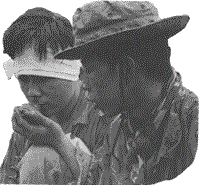Psychological Operations - the name itself sounds spooky and sinister.
The words conjure up images of playing with someone's mind. Psy-ops is a fact
of military life today - winning the hearts and minds of the enemy is considered as
important as winning that of the general populace. Weakening the enemy's resolve,
convincing them that their side is wrong, sure beats blasting them out of their holes with
hand grenades. The cost in human lives is considerably
less.
I almost said it costs no human lives at all - but that would end my story! That
lazy Vietnam evening, about an hour after dark, I was lying on top of my bunker, watching
the stars above me. Cricket songs flooded in from the surrounding sea of grass.
From within the Fire Base came the rock and soul sounds of Allied radio broadcasts,
the crackling of battalion and company radios over in the radio hootch, and the voices of
soldiers in the dark with nothing to do but talk.
From the general vicinity of Cu Chi about ten miles away, I noticed a blinking
navigation light moving towards us through the night sky. It came slowly - probably
a "Bird Dog" light-observation plane, usually a Piper Cub or similar prop.
After a few minutes I could catch the drone of the engine, as the blinking lights
drew nearer. I hadn't seen one of these planes out at night before.
Out in the free-fire zones and along the border, night missions were common.
Helicopter gunships hunted for targets using starlight scopes; "sniffer" planes
sought out enemy concentrations using sophisticated instruments, and Phantoms roared
across the night sky dropping timed flares and taking pictures as each went off.
But around Patton we didn't see much night air activity unless we got into trouble - then
we'd call for anything that would come.
Something unusual was up - that's what caught my attention. I watched the plane
fly past us. About a mile away - in fact, just about where we had assaulted the
underground tunnel complex that day - the plane began a slow
circle in the sky. Soon the sound of a Vietnamese voice drifted to my ears.
The plane was broadcasting to the enemy below through loudspeakers mounted on the
plane. The fast-paced clipped words poured out, coaxing, pleading, cajoling the men
below to give up their weapons and come in for three squares a day and a warm bunk.
At least, that's what I think they were saying.
 The high-pitched voice went on and on. Then the
voice changed - perhaps now a prisoner was speaking. This voice was slow,
halting. Not professionally trained, but perhaps sincere. After a short
speech, ol' tongueflapper returned to the air, his honeyed words rolling on and on -
probably going for the sale.
The high-pitched voice went on and on. Then the
voice changed - perhaps now a prisoner was speaking. This voice was slow,
halting. Not professionally trained, but perhaps sincere. After a short
speech, ol' tongueflapper returned to the air, his honeyed words rolling on and on -
probably going for the sale.
What the men on the ground below thought about all this is difficult to say. From
what followed, I gathered that at least upper management wasn't going along with the
program. As the "Bird Dog" continued its lazy circles in the sky, a stream
of green dots floated up from the ground, searching for the plane in the dark. An
enemy .51 cal. heavy machine gun had opened fire. A moment later the deep pumping
sound reached our bunkers.
From his vantage point it was probably difficult for the pilot to look directly below
or behind the plane. He didn't see the shooting right away. For what seemed an
eternity, the plane continued its slow circle, and the loudspeakers blared away as
motormouth gave it his all. The tracers arched back and forth, searching. Then
in one brief instant the enemy gunners found their mark, and the sales-pitch was over.
There was a sudden squawk, and then silence. The sound of the plane's engine
changed to a lower pitch, it banked sharply, and dived toward the ground. I watched
closely to see if they had taken a serious hit. About halfway to the ground the
plane leveled out and made a beeline back toward Cu Chi. The blinking lights were
extinguished. The motor roared at full throttle. The plane, at least, seemed
O.K. I could only hope the occupants had fared as well.
